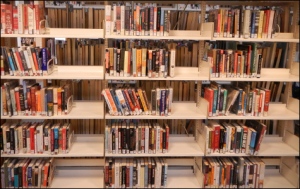
Alameda County Library bookshelves after weeding
Every time I read another report like Alameda County Trashes Library Books, my bookish heart skips a beat.
This is not the result of normal weeding, something all libraries must do to make room for new books. What I’m addressing is when the end game results in half empty shelves.
The various news stories all have the same theme. Orders come from above. Books must be hastily discarded. Librarians are not given time to make prudent decisions. And the guidelines for this new wave of discarding are absurd. (get rid of everything bought before 2001, or everything not checked out in the last 2 years)
I understand the necessity for weeding and I don’t have a radical mindset that believes every printed book is sacred. But these half-empty shelves are becoming an alarming trend. Deselection, which is polite “library speak” for discarding books, has guidelines. Most academic institutions and public libraries have them.
The Texas State Library and Archive Commission publishes a manual which uses the CREW method, the benchmark tool for weeding library collections since its inception in 1976. “A Weeding Manual for Modern Libraries” states: “The library staff will not need to fill the bottom shelves or pile books on top of the stacks, and the library will be more attractive and easier to use. Good practice says that shelves should never be more than 85% full (and 75% is even better).
Are the libraries following their own guidelines?
Not according to long time library staff members. From the East Bay Express news article: “The practice, they said, has been rushed and haphazard — and not in line with the standard guidelines for “weeding,” the term librarians use to describe the process of moving books out of collections. In Albany, thousands of good books that could be donated or given away are instead ending up in the trash, the employees said. They noted that while this policy is especially widespread at their branch, it appears that this careless discarding is happening across the Alameda County Library system.
My hometown library shelves resemble the ones in Alameda County. The last time I went to the library I was shocked.
 So I began investigating the extent of this kind of damage in other libraries. I came across too many reports of this extreme culling of books.
So I began investigating the extent of this kind of damage in other libraries. I came across too many reports of this extreme culling of books.
Suddenly the shelves are half empty. Neat, clean, sterile. The remaining books look traumatized, as if they might be the next to go.
Library employees speak only on terms of anonymity for fear of retribution. Other librarians try their best to rescue books marked for the garbage bins.
Saving books has become a subversive activity. Is this fear-based, money driven direction the way libraries are headed?
Making room for new popular books at the expense of those ‘dusty old books’ that libraries have always maintained—at least in my lifetime—because they are the connection to our past.There doesn’t seem to be any guidelines on the minimum end of the spectrum.
While I’d prefer my library look this,

Trinity College library, Dublin
I’d settle for a more comprehensive collection with ‘dusty old books’ packed to the full 85% on those shelves.
The Alameda County article states that “Increased funding for new supplies can drive the weeding process.” A most curious and disquieting concept, this rush to trash the past.So what if there’s a warehouse full of new books to fill those empty shelves? We are a culture that, on a whole, worships shiny new things, fads, youth and devalues what looks worn and shabby on the outside.
When libraries discard old books because they aren’t relevant to the current worldview, or their covers aren’t pretty anymore, they’ve become heedless of a huge chunk of their responsibility. The need to preserve our history.
Too many books dumped in garbage bins are the ones which connect us with our past. Destroying these books en masse destroys our history. As a result our society is dumbed-down. Without ‘older’ books, we remain culturally immature, narrow-minded, ignorant of where we’ve been as human beings.
Marcus Tullius Cicero, Roman philosopher and statesman, said this a long time ago, but his wisdom speaks volumes to our present state of affairs.
“To be ignorant of what occurred before you were born is to remain always a child. For what is the worth of human life, unless it is woven into the life of our ancestors by the records of history?”
——
Quotes from the Alameda County Trashes Library Books article:
“Everything the library bought before 2001, regardless of its merit or the significance of the book is sent to the discard pile.” As a result, he said there are noticeable gaps in subject matter across a wide range of sections, including music, philosophy, religion, biographies, and more. The fiction section, too, has suffered a noticeable disappearance of major authors, Hess said.
“… library employees contend that there has been no careful balance in deciding what books to toss during the current weeding process. “We are not opposed to weeding as a general thing,” said another employee whom the Express agreed not to identify because the person feared retribution. “But when you are doing it arbitrarily … that’s not the way you’re supposed to do it. … We’ve got these librarians running around trying to rescue books.”
Added a third employee: “Books are not being offered any place. They are just being thrown out. … It’s been heartbreaking.”




